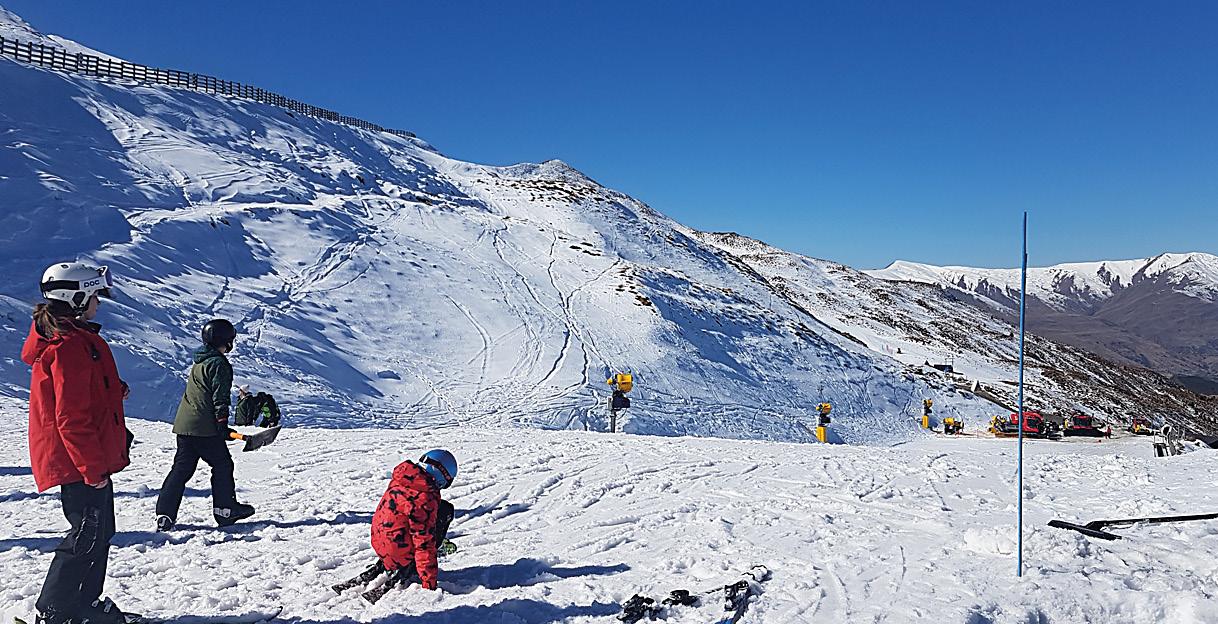
4 minute read
WINTER WONDERLAND
Nearing the end of each winter, Diabetes NZ Otago Youth bundle up a pack of excited teens and head to the snow for their annual winter camp.
For over 20 years, Diabetes NZ Otago, in conjunction with Te Whatu Ora Southern, has run a winter ski and snowboard camp for youth aged 13–18 years who are living with type 1 diabetes. The camp is held over three days at Coronet Peak, with accommodation provided at the Southland Ski Club lodge.
As with the annual summer camp, no parents ever attend. This gives families a much-needed break from the day-to-day care of their young adult living with diabetes. The youth are well-looked after by a full paediatric diabetes medical team from Otago, along with a diabetes nurse from Southland.
The camp starts on a Friday morning with a loaded minivan and car leaving Dunedin, transporting the excited rangatahi to Queenstown.
The drive to Coronet Peak is broken up with lots of fun, including stopping in at Alexandra to have a go at curling at the ice rink, or mini golfing in Cromwell, and of course finding somewhere interesting to stop and have some kai. Once in Queenstown, the group meets up with more camp-bound teens coming from Southland and they all head to the ice rink for skating and bumper cars. Then, it’s time to drive up the mountain to the ski lodge for dinner.
The next morning, it’s an early start to get skis, boards, and gear fitted so everyone can be on the slopes by 9am. With lessons ready booked, it’s not long before the crew is let loose on the slopes. Lunch is provided back at the lodge for the hungry youth, and pockets are restocked with jellybeans or dextro tablets just in case anyone gets hit by a hypo while out and about.
After a full-on day on the slopes, everyone heads back to the lodge for a yummy dinner and night-time entertainment, such as night walks to check out the amazing stars, or laughter-filled quizzes.
Sunday morning has folks chasing further fun in Queenstown which is less than half an hour’s drive away. Here, the day is spent either on the Skyline Gondola and Luge rides, or activities such as ten pin bowling, escape rooms, and walks around the lakefront and gardens. After lunch, it’s time to start making their way back home.
CONNECTIONS MADE AND SECURED
Otago Type 1 and Youth Coordinator, Paula Fryer says the best part of these camps is seeing the connections the youth make with one another. Often, someone climbs in the van at the beginning of the trip not knowing anyone, but it’s never long before they’ve connected with another rangatahi and start chatting.
Because these camps have been running for two decades, lasting friendships have been built between our youth and the medical staff who normally only see each other in a clinical setting. On camp, the staff get to witness first-hand what day-to-day life is really like for youth living with diabetes as they are the ones who must get up throughout the night for checks and to deal with any hypos.
Most families are eligible for Carer Support hours through Health New Zealand | Te Whatu Ora which, along with a family contribution, helps fund their teen to attend camp. Fundraising by Diabetes NZ Otago Youth is also done throughout the year to help keep the costs down for families as Paula says she understands that financially, camps can be expensive for families. As always, she welcomes any sponsorship, donations, or assistance from the public to help fundraise.
Paula adds that the highlight of her year is organising not only the winter camp but also the summer camp which is held for children aged 8–12 years. She says she only needs to see the excitement on the kids’ faces when they reconnect with past camp friends for her to agree that her job is utterly rewarding.











